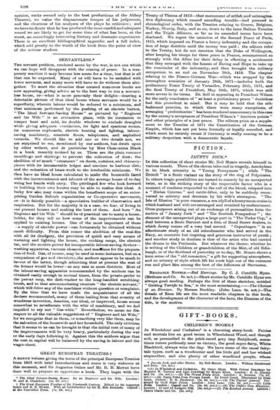GREAT E1TROPEAN TREATIES4
A HANDY volume giving the texts of the principal European Treaties from ISIS with brief Introductions and notes is very welcome at this moment, and Sir Augustus Oakes and Mr. R. B. Mowat have done well to prepare so opportune a book. They begin with the • The Ideal Serrotnit-Sasing House. By an Engineer and his wife. London: W. and It. Chambers. Bs. 8d. net.] t The Great European Treaties of the Nineteenth Century. Edited by Sir Augustus Oakes and It. B. Mowat. With an Introduction by Sit R. Erie Richards. Oxford : at the Clarendon Freya. 178. [kl. net.] Treaty of Vienna of I815—that monument of 'selfish and unimagina- tive diplomacy which caused unending trouble--and proceed in chronological order, with the Treaties relating to Greece, Belgium, Turkey, Slesvig, Italy, and so on, down to the later Balkan Treaties and the Triple Alliance, so far as its amended terms have been disclosed. We regret the omission of the Second Peace of Paris,, 1815, which imposed on France a heavy indemnity and the occupa- tion of large districts until the money was paid : the editors refer to the Treaty,. but do not mention that the Duke of Wellington, after keeping his troops for three years in France, remonstrated so. strongly with the Allies for their delay in effecting a settlement that they arranged with the houses of Baring and Hope to take up the remainder of the indemnity, and. then brought the military occupation to an end on November 30th, 1818. The chapter relating to the Franco-German War—which was stopped by the incomplete armistice of January 28th, 1871—includes both the preliminary Peace Treaty of Versailles, February 26th, 1871, and the final Treaty of Fre.ukfort, May 10th, 1871, which was still. more severe in its terms. Dr. Solf in appealing to President Wilson for the early conclusion of " at least a preliminary peace" doubtless, had this precedent in mind. But it may be held that the old- fashioned practice, to which there were many exceptions, of. arranging " preliminaries " has been rendered unnecessary in this,case by-the enemy's acceptance of President Wilson's " fourteen points" and other principles of a just peace. The editors print as a supple- ment to the Treaties of 1871 the Constitution of the German, Empire, which has not yet been formally or legally annulled, and which must be entirely recast if Germany is really ceasing to be a military despotism with a democratic facade.






































 Previous page
Previous page